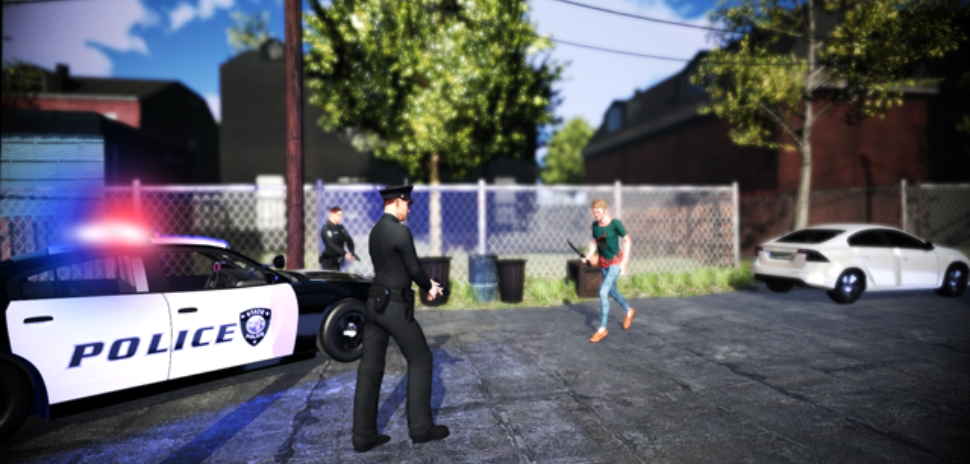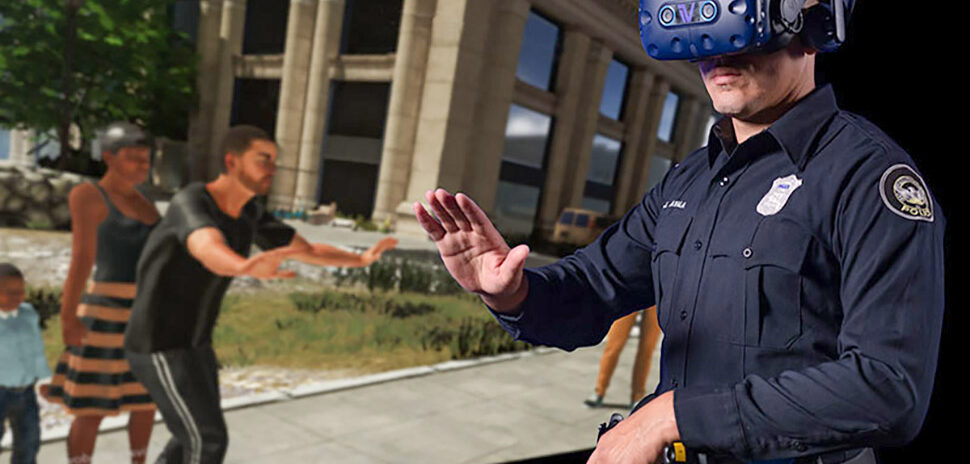Virtual reality can be fun and games, but the tech’s use cases go way beyond that. One Richardson startup called SURVIVR is using the emerging technology to empower officers to better protect communities and themselves.
What started as an action-horror VR game filled with hordes of demonic creatures has now pivoted into a real-life training for law enforcement.
Brian Hoang, a recent UTD graduate, and his co-founder, Marwan Kodeih, originally founded SURVIVR in 2016 as a game development studio called Immosis. In 2017, it transitioned to serve clients across training, education, gaming, and healthcare.
But, its breakthrough moment came in 2018, when Rob Griffin entered the picture.
Hoang recalls meeting Griffin while recording a radio show on entrepreneurship. It was then that he first tried a VR game, and he saw its potential immediately.
“He was basically blown away,” Hoang says. “That was the first time he had been exposed to VR. He thought it was so immersive how the monsters [in the game] were getting all up in his face.”
But Griffin wanted to take it a step further. After witnessing how immersive and realistic the demo was, Griffin, a former police officer, insisted the team apply their expertise to real-world training.
Griffin asked Hoang if the program could, for example, drop him into a traffic stop or an active shooter situation instead of a cave of zombies. The answer: a resounding yes. And its impact was seen almost immediately.
Now, SURVIVR—dubbed ‘The Future of Police Training’—is on an upward trajectory to take over Texas and beyond in the next year.
SURVIVR’s first “aha” moment was the reception the software received from real law enforcement officers in demonstrations (the company has done about 16 since March).
“Not only do police think VR training is the future, but some of them outright said they prefer this over existing systems out there, which are basically TV screen-based,” Hoang says. “Already, they’re saying they prefer our tech over established company’s.”
Looking to grow
SURVIVR has also presented its tech to two large organizations: the North Texas Police Chiefs Association and the Caruth Police Institute.
But, it’s not getting attention just in the world of law enforcement. Hoang says the startup took third place at UT Austin Disrupt Texas last year and first place at the UT Dallas Big Idea Competition this year, receiving an estimated $40,000 in prizes so far.
It’s also one of 74 startups accepted to the MassChallenge International Accelerator this year. Dubbed by MassChallenge as the “top startup applicants from around the world,” the 74 companies will compete for up to $500,000 in equity-free cash prizes.
SURVIVR is working now to scale, ideally with the help of some funding. Hoang says its now in a pre-seed round and aims to raise at least $150,000 in funding.
“We’re pretty lean,” he says. “We can make a little bit of money last a long time.”
In addition to raising money, SURVIVR is working to enter the law enforcement market, starting first with Texas’ estimated 2,700 law enforcement departments. It’s already made its way into four, in Richardson, Frisco, Colleyville, and Rowlett. It’s also in talks to get the software in a North Texas sheriff’s office’s curriculum.
But, for now, the company’s potential impact can’t be overstated.
“[VR training is] way more cost effective,” he says. “It eliminates the need for ammunition. Every time you pull a trigger it costs money.”
Not only does the cost of ammunition add up quickly, so does travel, paid training, and overtime. “What you find is that two weeks of training 400 officers can incur six figure costs,” Hoang says. “And that’s just for one active shooter training course.”
Additionally, the software allows for ongoing, on-the-job training and continuing education that can’t be accessed via a standard training model, including implicit bias training.
“We want to give them as much exposure to what could happen in the real world—many possibilities and scenarios—so that when they’re actually out there doing their job,” Hoang says, “they can go home at night, and so can we.”
![]()
Get on the list.
Dallas Innovates, every day.
Sign up to keep your eye on what’s new and next in Dallas-Fort Worth, every day.


































































